Jack Greenwell: From Durham miner to Barcelona FC coach
- Published
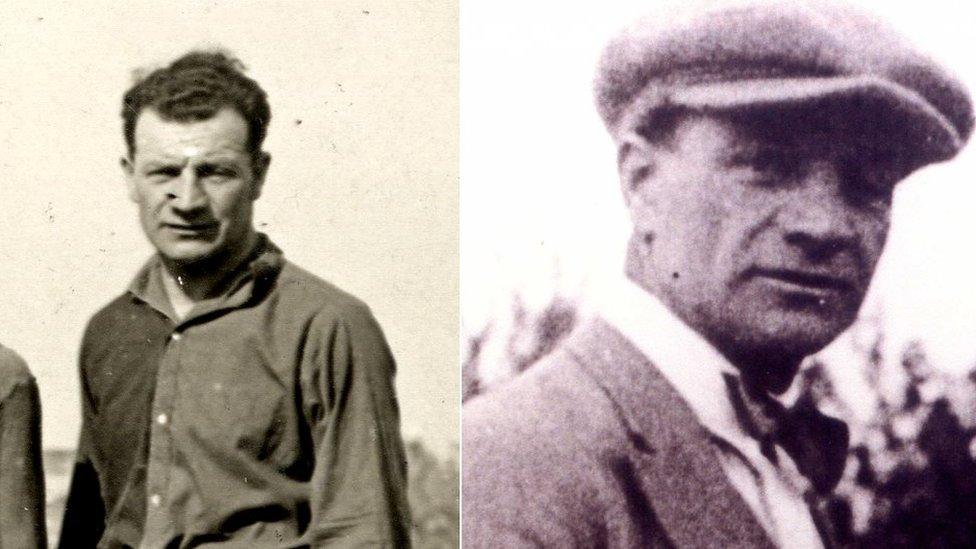
Jack Greenwell played 88 times for Barcelona before becoming the club's coach
Barcelona FC are now synonymous with beautiful, passing football but the Catalan club's traditions can be traced back to the vision of a former miner from north-east England.
Jack Greenwell's move to Spain in 1912 caused amazement among his neighbours in Crook, a colliery town in County Durham's Wear Valley.
"Most people found it an adventure just going to Bishop Auckland," recalled Cicely Hetherington, then a six-year-old whose family were friends of the Greenwells.
Bishop Auckland was five miles away (8km), Barcelona 1,200 (1,900km).
His story, which took him from his hometown club to a successful coaching career in Europe and South America, was made for the movies, according to journalist Rory Smith.
"His story is extraordinary and needs to be told," he said.
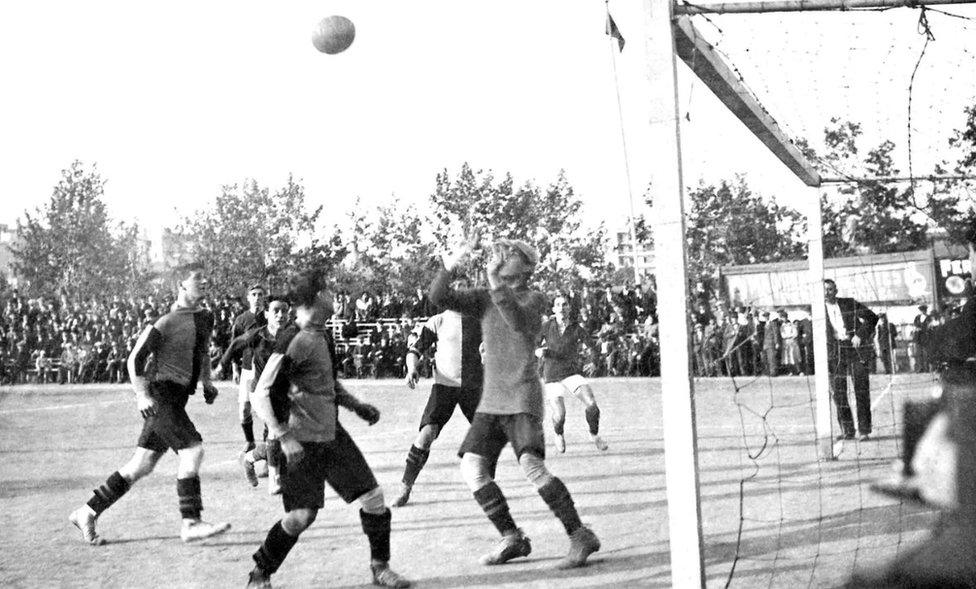
Jack Greenwell won one local league title with Crook Town
Greenwell was born in 1884 in Crook, then a prosperous and busy town surrounded by collieries.
After leaving school he became a miner and started playing as a winger for Crook Town when he was 17. In 11 seasons, he won one Crook and District League title and made numerous appearances in the FA Cup.
In 1909 he was a guest player for West Auckland Town when they won the Sir Thomas Lipton Trophy, regarded by some football historians as "the first World Cup", in Italy.
Three years later, the 28-year-old moved to Barcelona, then competing in the Campionat de Catalunya (Catalonia Championship), a predecessor to Spain's modern La Liga.
How the move came about is something of a mystery, although Crook historian Michael Manuel has a theory.
"He probably made connections through travelling to Italy with West Auckland," he said.
"Probably there was someone from Barcelona there who liked what they saw who then spent a year or two trying to persuade him to go over."
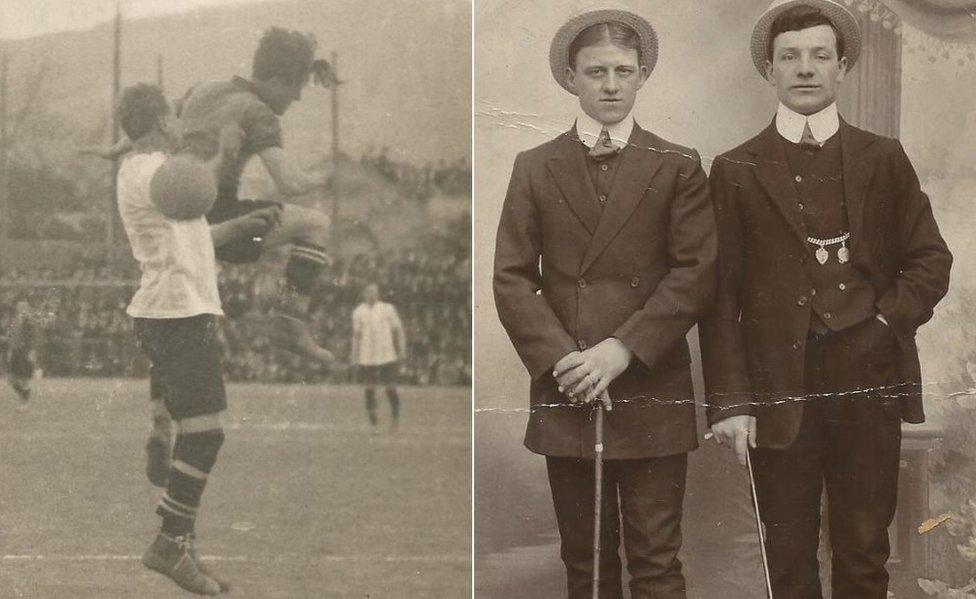
Jack Greenwell (far right) left his home and family to play and teach football in Spain and South America
Greenwell played 88 times for Barcelona scoring 10 times and winning two Catalonia Championships. His real impact on the club came after he hung up his boots however.
"Football was very much played in a certain way, there were no real tactics at that time" said Mr Smith, a football journalist for the Times who has also written a book, Mister, about Greenwell and five other Englishmen who helped globalise the game.
"You had two defenders, three midfielders and five strikers essentially and that was it, no-one moved.
"Greenwell started a very early form of experimenting with that, so he took Paulinho, who was Barcelona's star striker, and played him as a centre back.
"It didn't really work but it's [him] starting to think maybe if we put a ball-playing central defender in there maybe we can build from the back."
Greenwell's philosophy was to start attacks in defence with players passing the ball to each other rather than dribbling past opponents.
"He encouraged the passing style and at the time that was really rare," said Mr Smith.
"That made him unique. Sadly, in England no-one really wanted anyone to do that."

Fellow pioneer Fred Pentland
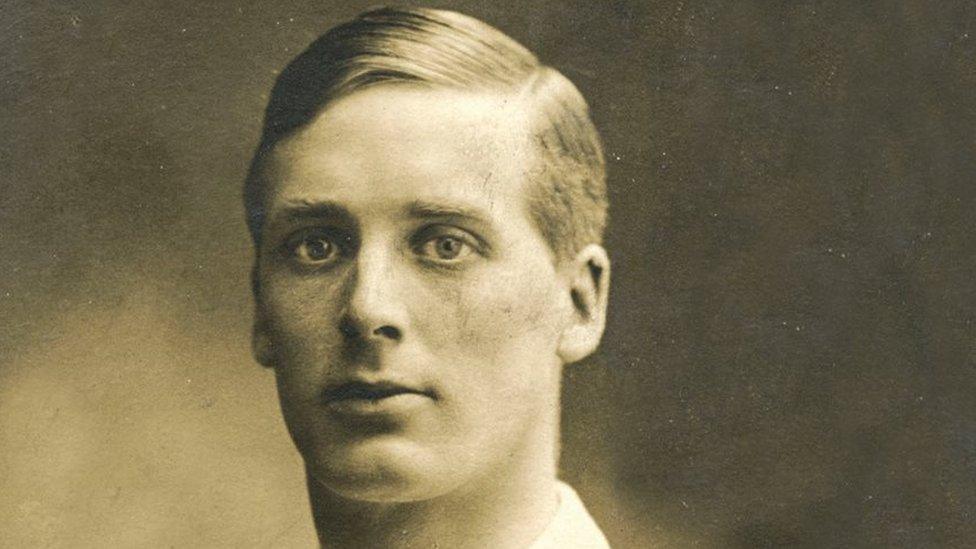
Fred Pentland won five caps with England
While Greenwell was at Barcelona, another Englishman was also making his mark in Spain.
Fred Pentland, who had played 96 times for Middlesbrough and five for England, took over Athletic Bilbao in 1921 and won two league titles and four consecutive cups.
On the field he preached "serenity and intelligence" on the ball, demanding his players use both feet.
He told them: "The purpose of the game of football is to shoot, you must strike the ball hard, rapidly, curtly, you must take a shot at goal constantly."
Pentland also remained resolutely English, wearing a bowler hat at each game. After every win, the hat would be taken and destroyed by his players.
"He went through 20 hats a seasons which is quite a good indication he was good at his job," said Mr Smith.
He also managed the France and Germany national teams.

Greenwell started his seven-year tenure at the helm in 1917 with the club going on to win four Catalonia Championships and two Copa Del Reys - the Spanish equivalent of the FA Cup - during his spell in charge.
But his legacy is much more than trophies, according to Andy Murray, a writer and expert on Spanish football for FourFourTwo magazine.
Greenwell established the passing philosophy which has become Barcelona's trademark.
"He is without a doubt one of the most influential and essential figures in creating that," said Mr Murray.
"The preference in the English game at that time was for a jinking winger who would take on a full-back and charge at them.
"Using more passing was seen as a bit of a cop out.
"That's one reason why people like Greenwell went abroad where their ideas would be appreciated.
"He and others like him trained those in other countries to be better than we were."
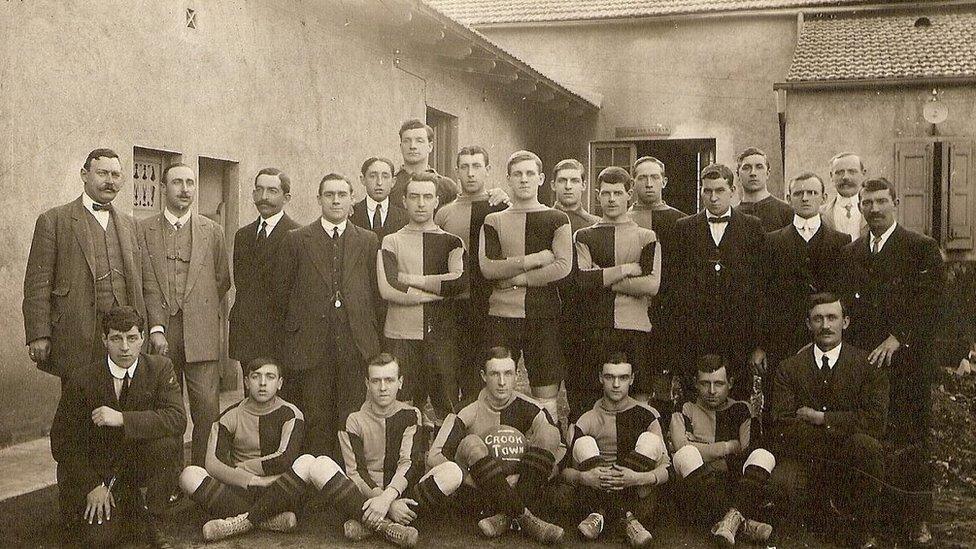
Jack Greenwell (back row) played for Crook Town for 11 years
He left Barcelona in 1923 to take over their rivals RCD Espanyol, with whom he finished seventh in the inaugural season of La Liga and won another Catalonia Championship and Copa Del Rey in 1929.
Greenwell returned to Barcelona in 1931, winning another league title before heading to Valencia two years later and then, upon the outbreak of the Spanish Civil War in 1936, headed to Turkey.
In 1939, Greenwell, who by this point had married Doris Rubinstien, an English dancer he met at the Moulin Rouge in Paris, moved to Peru to manage both the national team and Universitario de Deportes.
He led Peru to their first South American Championship title, now known as the Copa America, in 1939 and in the same season guided his club to win the Peruvian league.
Greenwell then moved to Colombia in 1940 to manage the national side before suffering a fatal heart attack in Bogota two years later as he was driving home from a training session.
He was 58-years-old and alone, his wife and daughter, Carmen, having stayed in Peru.
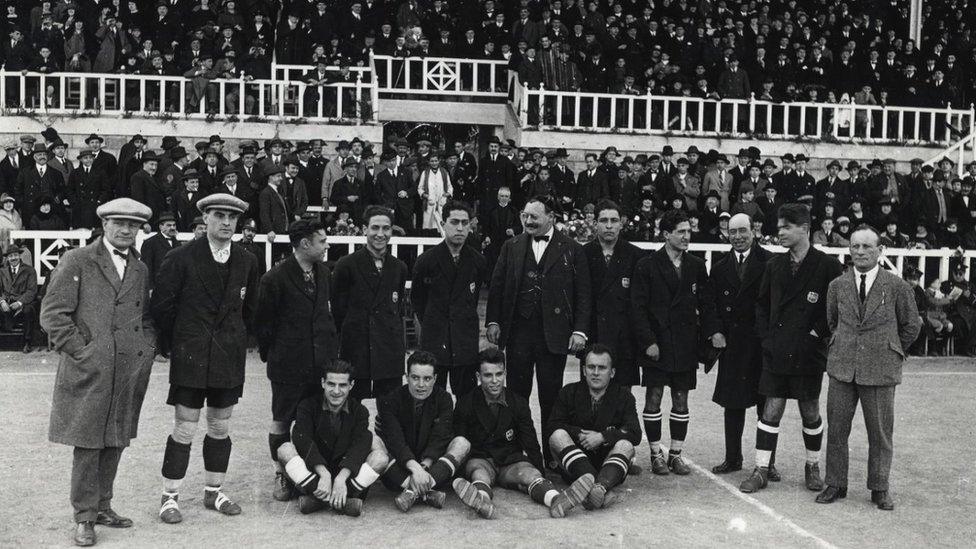
Jack Greenwell (far left) had two spells coaching Barcelona
"What's really sad about is he gave everything up for football all of the time," said Mr Smith.
"He leaves Crook, his home and family for Spain, then he has to leave everything in Spain because of the war and then he leaves his family in Peru to go to Colombia.
"It's a very powerful story of someone who just wants to teach football."
Now plans are afoot to have a memorial plaque and bench placed in his home town, Mr Manuel said.
"We think this man should be commemorated, he was one of Crook's famous sons, he stands out as a forgotten football superstar."